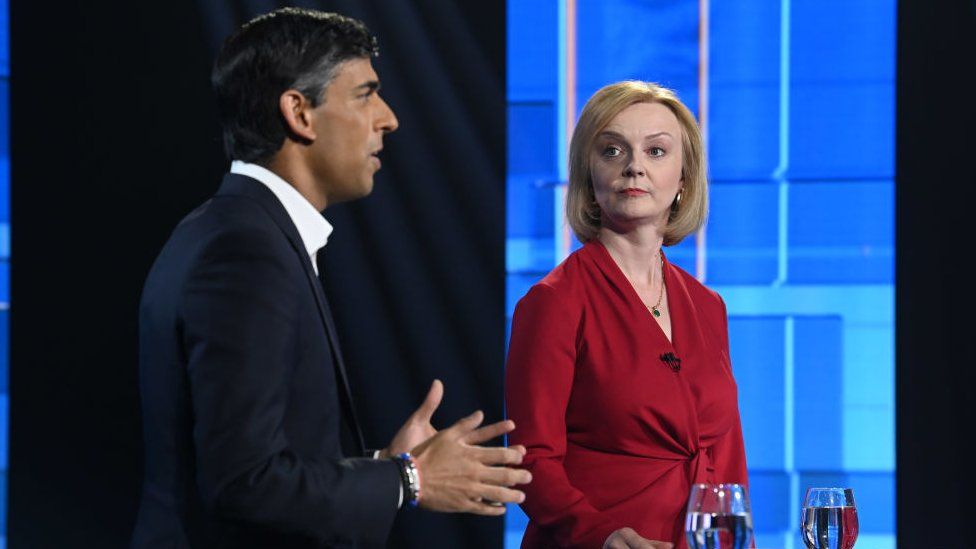
Pledges to slash taxes by Conservative leadership candidates are “unrealistic” unless they are matched by spending cuts, a think tank has warned.
The Institute for Fiscal Studies (IFS) said large, permanent tax cuts could add to pressures on the public purse as the economic outlook deteriorates.
Both Rishi Sunak and Liz Truss have promised tax cuts but say their plans are affordable.
The UK will find out who its next prime minister is on 5 September.
The soaring cost of living will be among the biggest challenges facing whoever succeeds Boris Johnson, with calls for more help growing louder.
The IFS’s warning comes as consumer prices continue to soar, with inflation hitting 10.1% in July – a fresh 40-year high. Rising living costs are eating into household budgets, with prices rising at a faster rate than wages.
Meanwhile, the Bank of England has warned high prices will push the UK into recession, with the economy forecast to shrink in the last three months of 2022 and keep shrinking until the end of 2023.
And a new University of York study estimates two-thirds of UK households could be plunged into fuel poverty and struggle to pay energy bills this winter, the Guardian reported.
Foreign Secretary Ms Truss, who is the favourite to win the race, has pledged to scrap April’s National Insurance rise to help households and cancel a planned rise in corporation tax.
She has argued high taxes are “potentially choking off growth” in the economy.
Meanwhile, former Chancellor Mr Sunak has promised to reduce VAT on domestic energy bills from 5% to zero, and to cut 3p off income tax by late 2029.
However, he says he will only cut taxes “once we’ve gripped inflation” and claims Ms Truss’s pledges are unaffordable and won’t help those on low incomes.
But Carl Emmerson, deputy director of the IFS, told the BBC that both candidates’ plans would be unaffordable without spending cuts – none of which have been proposed by the campaigns.
“These tax cut promises are unrealistic unless they’re going to set out detailed, deliverable spending cuts on a comparable scale,” he said.
“In reality, there will be a need to spend significantly more, especially given the pressures on households with energy bills.”
Mr Emmerson suggested that short-term government borrowing could be appropriate, to help fund support for families struggling to make ends meet.
But he said “large, permanent tax cuts” would only exacerbate pressures on the public finances, and were “hard to square” with the candidates’ promises to manage the nation’s finances responsibly.
Last month, the Office for Budget Responsibility (OBR) warned that UK government debt is already on an “unsustainable path” because of inflation and other factors.
‘Worsening outlook’
The IFS said it was concerned by Ms Truss and Mr Sunak’s tax plans given the “deteriorating outlook”.
In its report, the think tank predicted that high inflation could result in more public spending – adding £4bn to the benefits bill, while tens of billions of pounds may have to go to the likes of schools and hospitals, as their bills soar, to help maintain services.
It said this was unlikely to be offset by tax revenues, leaving no spare public money to fund large-scale tax cuts.
Responding to the report, Mr Sunak’s campaign said his tax plans were funded and that the IFS’s research supported his approach.
“[The report] drives a coach and horses through Liz’s economic plan. Rishi has consistently made the case that permanent, unfunded tax cuts would cause significant damage to the public finances and push inflation up higher,” a spokesman said.
“It is not credible or Conservative to spend £50bn on tax cuts and pay for them through higher borrowing at a time of high inflation.”
A source for Ms Truss’s campaign told PA news agency that she “would use an emergency budget to kickstart her plan to get our economy growing and put more money into the pockets of hardworking people”.
“Liz will cut taxes using the existing fiscal headroom and will get debt to GDP falling within three years. You cannot tax your way to growth, and business as usual will not do.”